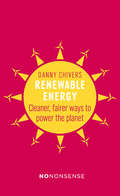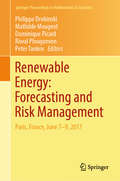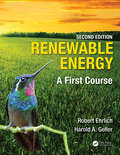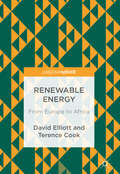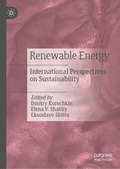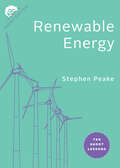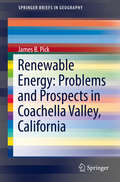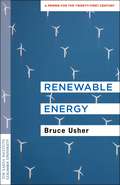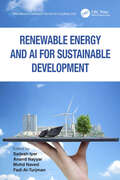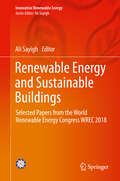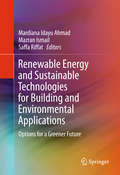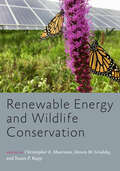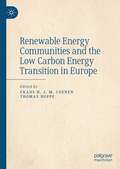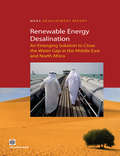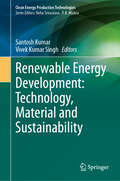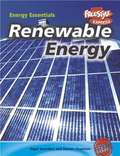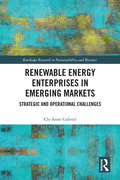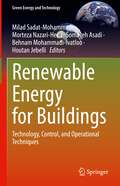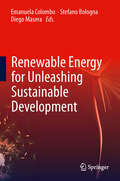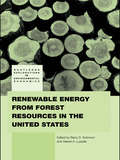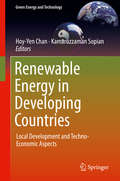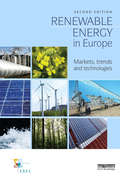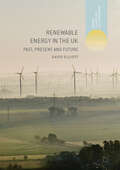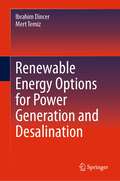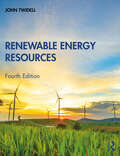- Table View
- List View
Renewable Energy: Cleaner, fairer ways to power the planet (No-Nonsense Guides #35)
by Danny ChiversFew people doubt the threat of climate change and the urgent need to conquer fossil fuel addiction. But can renewable sources of energy ever be sufficient to provide modern societies with a decent quality of life? This book is clear. They can. And it outlines the strategies to break the barriers to a 100% renewable world. Danny Chivers presents a compelling introduction to renewable technologies for non-technical readers (solar, wind, hydro, geothermal and ambient heat, wave and tidal, fuel crops, and energy from waste) and a roadmap to powering the world, not just sustainably, but democratically.
Renewable Energy: Paris, France, June 7-9, 2017 (Springer Proceedings in Mathematics & Statistics #254)
by Philippe Drobinski Mathilde Mougeot Dominique Picard Riwal Plougonven Peter TankovGathering selected, revised and extended contributions from the conference ‘Forecasting and Risk Management for Renewable Energy FOREWER’, which took place in Paris in June 2017, this book focuses on the applications of statistics to the risk management and forecasting problems arising in the renewable energy industry. The different contributions explore all aspects of the energy production chain: forecasting and probabilistic modelling of renewable resources, including probabilistic forecasting approaches; modelling and forecasting of wind and solar power production; prediction of electricity demand; optimal operation of microgrids involving renewable production; and finally the effect of renewable production on electricity market prices. Written by experts in statistics, probability, risk management, economics and electrical engineering, this multidisciplinary volume will serve as a reference on renewable energy risk management and at the same time as a source of inspiration for statisticians and probabilists aiming to work on energy-related problems.
Renewable Energy: A First Course (Second Edition)
by Robert Ehrlich Harold A. Geller<p>This revised edition is fully updated and continues to provide the best in-depth introduction to renewable energy science. It focuses mainly on renewable energy, but also addresses nonrenewable energy (fossil fuels and nuclear technology). The coverage extends from the basic physics to conservation, economic, and public policy issues, with strong emphasis on explaining how things work in practice. <p>The authors avoid technical jargon and advanced math, but address fundamental analytical skills with wide application, including: <p> <li>Two brand new chapters giving an introduction to population dynamics and statistical analysis for energy studies Additional self-study problems and answers <li>More worked examples <li>Up-to-date coverage of areas such as hydraulic fracturing, integration of renewable energy to power grid, and cost.</li> </p>
Renewable Energy: From Europe To Africa (Issues In Environmental Science And Technology Ser. #19)
by David Elliott Terence CookSignificant progress has been made by industrial countries to reduce emissions from the use of fossil fuels, but as the economies of the less-developed regions of the world begin to expand, they too will face similar challenges. This book looks at energy transitions being made in developing countries, focusing on the adoption of renewable energy systems in Africa, for example under the UN Sustainable Energy for All programme, but also by the EU in the Former Soviet countries of Eastern and Central Europe. It draws on experience from involvement with programmes in the EU and Africa and will be of great interest to academics, policy makers and practitioners in the development aid and renewable energy policy fields.
Renewable Energy: International Perspectives on Sustainability
by Dmitry Kurochkin Elena V. Shabliy Ekundayo ShittuThis book bringing together leading researchers in the field of renewable energy to discuss sustainability on a broad scale and to examine the status quo of renewable energy industry development in a global context. The volume starts with the European Union, then reviews current trends in the United States as well as the Middle East, Central Asia, and Latin America. It moves on to analyze the German transition to one hundred percent renewable energy economy and energy systems (Energiewende) with a climate protection plan and sustainable economic development; and continues on to examine the determinants of the adoption of sustainable solutions in Finland and discuss the renewable energy agenda in the European Union with the 17 Sustainable Development Goals at its core. Climate change has become one of the main global drivers for policy and this book discusses both it’s over all global development as well as spotlighting localized progress across multiple continents. Over one hundred and fifty countries have developing sustainable energy policies, tax incentives, and laws. China remains the leader in renewable energy generation; and countries including the United States, the UK, India, Spain, and Turkey, compete in the Renewable Energy Sector to attract investments. In 2018, global investments in renewables exceeded $200 billion. The state of Bahia in Brazil has been experiencing a surge in wind energy production; and public policy has had a positive effect on that expansion. Kazakhstan is a country with great renewable energy prospects, particularly in wind, hydropower plants, and solar energy. This book is a comprehensive overview and invaluable reference for all those in the renewable energy sector.
Renewable Energy: Ten Short Lessons (Pocket Einstein Series)
by Stephen PeakeAn expert introduction to the fascinating world of renewable energy and the transition from fossil fuels to clean energy that lies at the heart of a brighter climate future.In Renewable Energy: Ten Short Lessons, Stephen Peake distills the key issues of this timely subject, examining how we can harness the power of a range of groundbreaking energy technologies most effectively to achieve a sustainable energy future. Renewable energy is central to managing climate change and our transition to a sustainable energy supply for the 10 billion of us who will populate the earth by 2050. But how will we cope without fossil fuels to heat, cool, and light our buildings, power our industry, and run our transport systems? And are some renewables better than others? Packed full of easy-to-understand diagrams and fact boxes, these ten lessons cover all the basics, as well as the latest understanding and developments, to enlighten the nonscientist. About the series: The Pocket Einstein series is a collection of essential pocket-sized guides for anyone looking to understand a little more about some of the most important and fascinating areas of science in the twenty-first century. Broken down into ten simple lessons and written by leading experts in their field, the books reveal the ten most important takeaways from those areas of science you've always wanted to know more about.
Renewable Energy: Problems and Prospects in Coachella Valley, California (SpringerBriefs in Geography)
by James B. PickThe book analyzes the problems and potential of renewable energy development for the Coachella Valley of California and provides a useful case study for renewable energy feasibility assessments for other areas. A conceptual model, Integrated Policy Assessment Theory for Renewable Energy, is given and justified for renewable energy development in the Valley. Further, Central Place Theory, well known in urban geography, is discussed and it is seen to be very relevant to the understanding the Coachella Valley’s city sizes and renewable energy markets, compared to the greater Los Angeles region. The book’s research methods include geospatial mapping and analysis and interviews leaders in small innovative firms, government agencies, and nonprofits. The many findings of the book include evaluation of how the Valley’s socioeconomic and transportation features influence renewable energy development, the scope of markets for solar and wind energy in the Valley, spatial confluences of renewable energy facilities with other features, and the future potential of ground-source heat pumps. Benchmark comparison of the Coachella Valley is done with two leading wind and solar regions elsewhere in the country, to assess the Valley’s evolution and opportunities in renewable energy. The book concludes by evaluating the prospects and problems for the growth of renewable entrepreneurship, manufacturing, assembly, and operations in Coachella Valley. This leads to policy recommendations grounded in the book’s research findings, which are intended for use by governments, businesses, and nonprofits. The hope is that many of the developmental experiences from the Coachella Valley will be helpful not only within the Valley but to other communities nationwide and worldwide.
Renewable Energy: A Primer for the Twenty-First Century (Columbia University Earth Institute Sustainability Primers)
by Professor Bruce UsherFrom wood to coal to oil and gas, the sources of energy on which civilization depends have always changed as technology advances. Now renewables are overtaking fossil fuels, with wind and solar energy becoming cheaper and more competitive every year. Growth in renewable energy will further accelerate as electric vehicles become less expensive than traditional automobiles. Understanding the implications of the energy transition will prepare us for the many changes ahead.This book is a primer for readers of all levels on the coming energy transition and its global consequences. Bruce Usher provides a concise yet comprehensive explanation for the extraordinary growth in wind and solar energy; the trajectory of the transition from fossil fuels to renewables; and the implications for industries, countries, and the climate. Written in a straightforward style with easy-to-understand visual aids, the book illuminates the strengths and weaknesses of renewable energy based on business fundamentals and analysis of the economic forces that have given renewables a tailwind. Usher dissects the winners and losers, illustrating how governments and businesses with a far-sighted approach will reap long-term benefits while others will trail behind. Alongside the business and finance case for renewable energy, he provides a timely illustration of the threat of catastrophic climate change and the perils of delay. A short and powerful guide to our energy present and future, this book makes it clear that, from both economic and environmental perspectives, there is no time to lose.
Renewable Energy and AI for Sustainable Development (Innovations in Intelligent Internet of Everything (IoE))
by Sailesh Iyer Anand Nayyar Mohd Naved Fadi Al-TurjmanElectronic device usage has increased considerably in the past two decades. System configurations are continuously requiring upgrades; existing systems often become obsolete in a matter of 2–3 years. Green computing is the complete effective management of design, manufacture, use, and disposal, involving as little environmental impact as possible. This book intends to explore new and innovative ways of conserving energy, effective e-waste management, and renewable energy sources to harness and nurture a sustainable eco-friendly environment. This book: • Highlights innovative principles and practices using effective e-waste management and disposal • Explores artificial intelligence based sustainable models • Discovers alternative sources and mechanisms for minimizing environmental hazards • Highlights successful case studies in alternative sources of energy • Presents solid illustrations, mathematical equations, as well as practical in-the-field applications • Serves as a one-stop reference guide to stakeholders in the domain of green computing, e-waste management, renewable energy alternatives, green transformational leadership including theory concepts, practice and case studies • Explores cutting-edge technologies like internet of energy and artificial intelligence, especially the role of machine learning and deep learning in renewable energy and creating a sustainable ecosystem • Explores futuristic trends in renewable energy This book aims to address the increasing interest in reducing the environmental impact of energy as well as its further development and will act as a useful reference for engineers, architects, and technicians interested in and working with energy systems; scientists and engineers in developing countries; industries, manufacturers, inventors, universities, researchers, and interested consultants to explain the foundation to advanced concepts and research trends in the domain of renewable energy and sustainable computing. The content coverage of the book is organized in the form of 11 clear and thorough chapters providing a comprehensive view of the global renewable energy scenario, as well as how science and technology can play a vital role in renewable energy.
Renewable Energy and Sustainable Buildings: Selected Papers from the World Renewable Energy Congress WREC 2018 (Innovative Renewable Energy)
by Ali SayighThis book contains selected papers presented during the World Renewable Energy Network’s 28thanniversary congress at the University of Kingston in London. The forum highlighted the integration of renewables and sustainable buildings as the best means to combat climate change. In-depth chapters written by the world’s leading experts highlight the most current research and technological breakthroughs and discuss policy, renewable energy technologies and applications in all sectors – for heating and cooling, agricultural applications, water, desalination, industrial applications and for the transport sectors.Presents cutting-edge research in green building and renewable energy from all over the world;Covers the most up-to-date research developments, government policies, business models, best practices and innovations;Contains case studies and examples to enhance practical application of the technologies.
Renewable Energy and Sustainable Technologies for Building and Environmental Applications
by Mardiana Idayu Ahmad Mazran Ismail Saffa RiffatThis diverse resource on renewableenergy and sustainable technologies highlights the status, state of the art,challenges, advancements and options in areas such as energy recovery systems,turbine ventilators, green composites, biofuels andbio-resources for energy production, wind energy, integrated energy-efficientsystems, thermal energy storage, natural ventilation & day-lightingsystems, and low carbon technologies for building and environmentalapplications. It is designed to serve as a reference book for students,researchers, manufacturers and professionals working in these fields. Theeditors have gathered articles from world-leading experts that clearlyillustrate key areas in renewable energy and sustainability. The distinct roleof these technologies in future endeavors is stressed by taking into accountthe opportunities to contribute with new approaches, methods and directions forbuilding and environmental applications. The in-depth discussion presented inthis book will give readers a clear understanding of every important aspect ofeach technology's applications, optimum configuration, modifications,limitations and their possible improvements.
Renewable Energy and Wildlife Conservation (Wildlife Management and Conservation)
by Christopher E. Moorman Steven M. Grodsky Susan RuppBrings together disparate conversations about wildlife conservation and renewable energy, suggesting ways these two critical fields can work hand in hand.Renewable energy is often termed simply "green energy," but its effects on wildlife and other forms of biodiversity can be quite complex. While capturing renewable resources like wind, solar, and energy from biomass can require more land than fossil fuel production, potentially displacing wildlife habitat, renewable energy infrastructure can also create habitat and promote species health when thoughtfully implemented.The authors of Renewable Energy and Wildlife Conservation argue that in order to achieve a balanced plan for addressing these two crucially important sustainability issues, our actions at the nexus of these fields must be directed by current scientific information related to the ecological effects of renewable energy production. Synthesizing an extensive, rapidly growing base of research and insights from practitioners into a single, comprehensive resource, contributors to this volume• describe processes to generate renewable energy, focusing on the Big Four renewables—wind, bioenergy, solar energy, and hydroelectric power• review the documented effects of renewable energy production on wildlife and wildlife habitats• consider current and future policy directives, suggesting ways industrial-scale renewables production can be developed to minimize harm to wildlife populations• explain recent advances in renewable power technologies• identify urgent research needs at the intersection of renewables and wildlife conservationRelevant to policy makers and industry professionals—many of whom believe renewables are the best path forward as the world seeks to meet its expanding energy needs—and wildlife conservationists—many of whom are alarmed at the rate of renewables-related habitat conversion—this detailed book culminates with a chapter underscoring emerging opportunities in renewable energy ecology.Contributors: Edward B. Arnett, Brian B. Boroski, Regan Dohm, David Drake, Sarah R. Fritts, Rachel Greene, Steven M. Grodsky, Amanda M. Hale, Cris D. Hein, Rebecca R. Hernandez, Jessica A. Homyack, Henriette I. Jager, Nicole M. Korfanta, James A. Martin, Christopher E. Moorman, Clint Otto, Christine A. Ribic, Susan P. Rupp, Jake Verschuyl, Lindsay M. Wickman, T. Bently Wigley, Victoria H. Zero
Renewable Energy Communities and the Low Carbon Energy Transition in Europe
by Thomas Hoppe Frans H. J. M. CoenenThis volume addresses renewable energy communities, and in particular renewable energy cooperatives (REScoops), in the context of the revised EU Renewables Directive. It provides a comprehensive account of the history and development of the renewable energy community movement in over six different countries of continental Europe. It addresses their visions, strategy, organisation, agency, and more particularly the challenges they encounter. This is of particular importance to gain more understanding into how renewable energy communities fare in domestic energy markets where they are confronted with regime institutions, structures and incumbents’ agency that tend to favour maintaining of the status quo while blocking attempts to empower and institutionalise renewable energy communities as market entrants having a disruptive, radical green and localist agenda. This volume will be an invaluable reference for academics and practitioners with an interest in social innovation in sustainable transitions, the role of community energy in energy markets, their agency, as well as an outlook to the impact that the EU Renewables Directive may have to change national legislation and policy frameworks to create a level playing field that is essentially more fair and beneficial to renewable energy communities.
Renewable Energy Desalination
by Bekele Debele NegewoThe Middle East and North Africa (MENA) Region is one of the most water stressed regions in the world. Water scarcity has already become a challenge to development in many of the countries. Due to increasing population and Projected climate change impacts, MENA's annual water demand gap is projected to grow five-fold by 2050, from today's 42 Km3 to 200 km3 by 2050. Despite its extreme scarcity, water is managed poorly. Inefficiencies are common in the agriculture, municipal and industrial systems; and many utilities are financially unsustainable. As a result, countries overexploit their fossil aquifers-and use desalination by fossil fuel-to meet the water demand gap. Desalination already plays a critical role in MENA's water supply portfolio. However, desalination is costly, energy intensive and has environmental impacts. On current trends, the projection is that, by 2050, Saudi Arabia and many other countries in the Region will consume for desalination most of the oil that they produce. Overexploitation of fossil aquifers is not sustainable. Neither is the use of fossil fuel for desalination to meet the growing water gap sustainable. This book outlines the challenges in terms of water (and also in terms of energy) that countries in the Region face and analyzes the scope of available options to address the growing water gap. The book estimates MENA's water gap today and into the future-until 2050; and presents a methodology to prioritize options to bridge the water gap, using the 'marginal cost of water' approach. The book also assesses the viability of renewable energy desalination as an important option to close the Region's water gap. The book compares the economic cost of desalination using fossil fuel and renewable energy sources, in particular the Concentrated Solar Power (CSP). The book also provides recommendations as to how CSP based desalination could ensure sustainable water supply for the Region.
Renewable Energy Development: Technology, Material and Sustainability (Clean Energy Production Technologies)
by Santosh Kumar Vivek Kumar SinghThis edited volume is a comprehensive guide to understanding and harnessing the power of renewable energy for a sustainable future. In a world dealing with the urgent need to combat climate change and reduce our dependence on fossil fuels, this book provides a new perspective on renewable energy. It is filled with cutting-edge research and practical insights, exploring the technologies, advanced materials, and sustainability practices driving the renewable energy revolution. Renewable energy resources are developing the latest advancements in solar, wind, hydro, geothermal, biomass, tidal, and wave energy technologies. This book is unique and opens a new window on classic renewable energy sources as well as new developments in technology, advanced material innovation, and sustainability aspects leading with various factors such as energy storage, transmission, institutional and economic factors, renewable energy application in smart cities, building and other solar thermal applications, environmental aspects, electrical energy generation, and climate change mitigation potential to achieve net-zero targets. This book is of interest to teachers, researchers, climate change scientists, capacity builders, and policymakers. Additionally, the book serves as an additional reading material for undergraduate and graduate students of sustainable energy, engineering, material science, and environmental sciences. National and international energy, sustainable and material scientists, managers, and policymakers will also find this to be a useful read.
Renewable Energy (Energy Essentials)
by Nigel Saunders Steven ChapmanThe book tells you all about the energy crisis the world is facing. But don't panic--it also explains how we can use other forms of energy to continue living our modern lives. It describes how ideas and technology can be used and developed to provide us with energy in the future.
Renewable Energy Enterprises in Emerging Markets: Strategic and Operational Challenges (Routledge Research in Sustainability and Business)
by Cle-Anne GabrielThis book highlights the challenges faced by renewable energy enterprises (REEs) in emerging markets, by reflecting on the enterprises&’ own stories and experiences. Research into REEs has focused largely on successful businesses and business models, and developed markets. With significant opportunities for renewable energy enterprise in emerging markets, this book presents a unique business-level perspective. It highlights the key barriers and outlines the strategic and operational solutions for success articulated by the entrepreneurs themselves. The research draws on interviews with entrepreneurs in twenty-eight emerging markets, including Barbados, Cambodia, Chile, Ghana, Indonesia, India, Kenya, South Africa and Uganda. The book concludes by summarising the key solutions for success and illustrating how successful REEs put them into practice. This book will be of great interest to students and scholars of renewable energy, sustainable business and the sustainability agenda in emerging markets.
Renewable Energy for Buildings: Technology, Control, and Operational Techniques (Green Energy and Technology)
by Milad Sadat-Mohammadi Morteza Nazari-Heris Somayeh Asadi Behnam Mohammadi-Ivatloo Houtan JebelliThe book covers practical applications and experimental results of integrating renewable energy technologies, energy storage facilities, and intelligent control and operation techniques into building energy systems. It introduces practical approaches to improving the energy systems of buildings in order to reduce energy consumption and cost. Renewable Energy for Buildings is suitable for retrofit engineers, energy engineers, and professionals, as well as researchers and developers in electrical engineering, architectural engineering, and mechanical engineering. Moreover, it can be used by undergraduate and graduate students to become familiar with the most recent developments in building energy systems.Examines the most recent developments in building energy systems;Looks at practical applications and theoretical aspects; Includes case studies.
Renewable Energy for Unleashing Sustainable Development
by Emanuela Colombo Stefano Bologna Diego MaseraThe book analyzes energy technologies, business models and policies to promote sustainable development. It proposes a set of recommendations for further activities and networking on access to energy and renewable energies and promotes an integrated approach to sustainable resource management. The book discusses access to energy, as a precondition for socio-economic progress. It depicts the global dimension of the challenge in terms of access to electricity and other forms of energy in developing countries. The three main interlinked topics related to energy and sustainable growth are separately discussed: appropriate technologies for modern energy services, business models for the development of new energy markets, and policies to support new energy systems. The description of activities and programmes of some public and private Italian stakeholders is also included.
Renewable Energy from Forest Resources in the United States (Routledge Explorations in Environmental Economics)
by Barry D. Solomon Valerie A. LuzadisInterest in biomass energy resources from forests, farms and other sources has been rapidly increasing in recent years because of growing concern with reducing carbon dioxide emissions and developing alternatives to increasingly scarce, expensive and insecure oil supplies. The uniqueness of this book is its coverage of biomass energy markets in the US from an economic as well as technical perspective. Existing books typically focus on single markets or technical aspects at the exclusion of economics, and have given greater coverage to biomass energy outside the US. This edited collection has three main parts. Part One provides a historical overview of forest biomass energy use in the US; the major technologies, economics, market prospects, and policies. Part Two presents forest biomass energy assessments, including life cycle and sustainability perspectives, and Part Three includes five sets of regional case studies. After reviewing the history of wood energy use in the US and technology options, the book shows that forests could displace sixteen per cent of domestic transportation fuel use in 2030. Renewable Energy from Forest Resources in the United States includes a Foreword from Chris Flavin, President of the Worldwatch Institute.
Renewable Energy in Developing Countries: Local Development And Techno-economic (Green Energy and Technology)
by Hoy-Yen Chan Kamaruzzaman SopianThis book discusses aspects of policy and techno-economic analysis of renewable energy in developing countries. Renewable energy technologies have been one of the most important strategies in addressing sustainable energy development and climate change. The roles of renewable energy in developing countries are vital, which include the accessibility of modern energy services in rural areas, climate change mitigation, energy security, green job creation and eventually improvement of quality of life. Part I of this book focuses on policy and strategy, while Part II focuses on technology development and feasibility. Chapters are contributed by leading experts from the ASEAN Center of Energy, government agencies, industries, and universities from five developing countries, including Malaysia, Indonesia, Vietnam, Brunei Darussalam and Bangladesh.
Renewable Energy in Europe: Markets, Trends and Technologies
by European Renewable European Renewable Energy CouncilHow can the European Union meet its binding 20% renewable energy target in final energy consumption by the year 2020? Which sources offer the best prospects for realizing this goal? These are the questions answered by this key book which analyses the current situation of renewable energy in Europe, examines the latest technological, financial and economic developments, and outlines ways in which the renewable energy market can be developed. The book is divided into sections examining the integration of renewable energy, electricity, heating and cooling as well as biofuels. All the main technologies are covered, with exploration of: ' benefits and applications ' costs and prices ' markets and installed capacity ' policy instruments ' key countries and success stories ' targets and long term potential This will be essential reading for policy decision-makers at all levels and to all those involved in the development of the renewable energy industry.
Renewable Energy in the UK: Past, Present and Future (Energy, Climate and the Environment)
by David ElliottThis book offers a detailed account of how renewable energy has moved from the margins to the mainstream in the UK, and of the battles that have been fought to achieve this, trawling through the often troubled history of government involvement. The book examines how renewables became what now seem likely to be the dominant energy sources of the future. Renewable energy technologies, using solar and wind power and other natural energy sources, are now supplying around 30% of UK electricity and appear set to continue expanding to supply around 50% within the next decade. Although the emphasis of the book is on the UK, developments there are compared with those in other countries to provide an overall assessment of the relevance of the UK experience. Chapters explore why the UK still lags behind many other countries in deploying renewables, in part, it is argued, due to its continued reliance on nuclear power. The book ends with a discussion on what sort of changes may be expected over the coming years. The author does not assume a single answer, but invites readers to consider the possibilities.
Renewable Energy Options for Power Generation and Desalination
by Ibrahim Dincer Mert TemizThis book examines simultaneous power generation and desalination driven by renewable energy systems. It covers all renewables, including solar, wind, geothermal, hydro, ocean and biomass as well as waste sources. This book also includes thermodynamic fundamentals, concepts, and system design, analysis and assessment studies, along with illustrative examples and case studies, for sustainable applications. It further provides an ample opportunity to learn more about cutting-edge technologies and newly developed systems for power generation and desalination.
Renewable Energy Resources
by John TwidellRenewable Energy Resources is a numerate and quantitative text. It covers the many renewables technologies implemented worldwide by harnessing sustainable resources, mitigating pollution and climate change, and providing cost effective services. This fourth edition is extensively updated by John Twidell with global developments as underpinned by fundamental analysis and illustrated by case studies and worked examples. Efficiency of end-use and cost-effectiveness is emphasized. Each chapter begins with fundamental scientific theory, and then considers applications, environmental impact and socio-economic aspects, before concluding with Quick Questions for self-revision, Problems and new Exercises. Basic theory underlying the technologies is covered in succinct Reviews of electrical power, fluid dynamics, heat transfer and solid-state physics. Common symbols and cross-referencing apply throughout; essential data are tabulated in Appendices. Renewable Energy Resources supports multidisciplinary master’s degrees in science and engineering, and specialist modules at undergraduate level. Practicing scientists and engineers will find it a useful introductory text and reference book.
